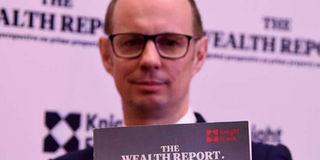A Kenyan communist party is here, and we might see more

Mr Andrew Shirley, editor of The Wealth Report, Knight Frank's global thought-leadership publication, displays a copy of the magazine at Serena Hotel on March 6, 2019. It’s possible to have a perfectly unequal world. PHOTO | DIANA NGILA | NATION MEDIA GROUP
What you need to know:
- “Tax the super rich big time” is a new rallying cry, making it both a very good and a very bad time to be a billionaire.
- In China, attempts at redistributing wealth have reduced poverty radically but also the inequality gap and super rich numbers have risen dramatically at the same time.
It’s not the kind of story you expect these days, but there it was. The Social Democratic Party, said a report in the Nation, had changed its name to Communist Party of Kenya from March 5, 2019.
“In an advertisement in the local dailies,” the story said, “Secretary-General Benedict Wachira said the party remains committed to its communist path founded on a Marxist-Leninist line and the strength of Kenyan working class and its allies”.
The difference between socialist/socialism and communist/communism is a fine one, and most people often use them interchangeably.
EQUALITY
However, definitions from Investopedia capture it well: “Communism and socialism are economic and political structures that promote equality and seek to eliminate social classes.
“In a communist society, the working class owns everything, and everyone works toward the same communal goal. There are no wealthy or poor people — all are equal, and the community distributes what it produces based only on need. …
“Like communism, socialism’s main focus is on equality. But workers earn wages they can spend as they choose while the government, not citizens, owns and operates the means for production. Workers receive what they need to produce and survive.…”
DIVIDE
To complete this, it defines capitalism: “In capitalist societies, owners are allowed to keep the excess production they earn. And competition occurs naturally … Capitalism tends to create a sharp divide between the wealthiest citizens and the poorest, however, with the wealthiest owning the majority of the nation’s resources.”
Communist parties have fallen out of fashion nowadays; the most successful one, the Chinese Communist Party, is now the world’s biggest capitalist party.
Still, renaming of Kenya’s SDP as communist is in line with the global shift to socialist sensibilities, with demands for a fairer sharing of wealth in a world that is increasingly unequal.
Few groups fuel this debate like the charity Oxfam, which has cornered the conversation with its annual world inequality report and ruffles feathers whenever it comes out.
TAX
This year’s spoke of a still-growing concentration of the world’s wealth, reporting that in 2018, the 26 richest billionaires owned as many assets as the 3.8 billion people who make up the poorest half of the world’s population.
The rich grew richer and the poor poorer, the Oxfam study said, with the wealth of over 2,200 billionaires in the world having increased by $900 billion — 12 percent — in 2018 against a fall of 11 percent in the wealth of the poorest half.
With this picture, we have the unusual spectacle of populist right wing parties (in Italy and Brazil, for example), which in years gone by would have been gung-ho capitalists, demanding for socialist-style redistribution of wealth to deal with this divide and the political polarisation it is causing almost everywhere in the world.
Extreme-left parties are demanding the same. “Tax the super rich big time” is a new rallying cry, making it both a very good and a very bad time to be a billionaire.
STRUCTURE
In China, attempts at redistributing wealth have reduced poverty radically but also the inequality gap and super rich numbers have risen dramatically at the same time.
Some obvious reasons: A billionaire owner of a firm that makes popular mobile phones can only become richer if you succeed in reducing poverty and people’s incomes rise sharply, because they will ditch their old handsets and upgrade or buy them for the first time.
The bigger problem, though, could be that we have reached a point where the current state structures are the problem. You cannot reduce inequality or make a dent on poverty much further than it is already.
First, all modern states depend on taxes (your own or others’ through aid or grants) and fees, not old-fashioned plunder and pillage, to run governments and manage countries.
PECKING ORDER
Invariably, you have to privilege the owners of capital (whether private business police, state/party bureaucrats and officials or the State is the “owner” of capital) over labour.
And within labour, you have a pecking order with higher-value producers up there and the “low value” down. You cannot escape paying the brain surgeon more than the sweeper at the hospital.
Then, the very act of redistribution, even in the purest of communist states, breeds inequality because there are big men and women with knives along the chain who decide how much to cut for whom.
And, of course, they will get a bigger cut. It’s possible to have a perfectly unequal world. It’s just that none of us who are demanding for it know how to make it happen, or if we do, we don’t have the guts to go for it, because it will eat us too.
Mr Onyango-Obbo is the publisher of Africapedia.com and explainer Roguechiefs.com. @cobbo3





